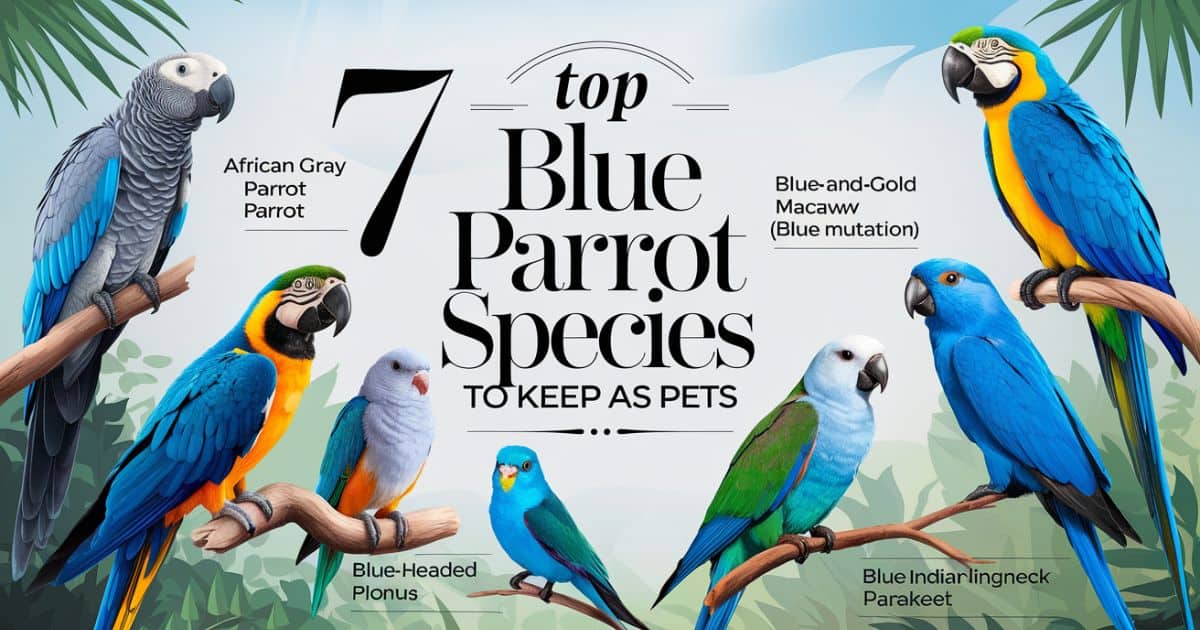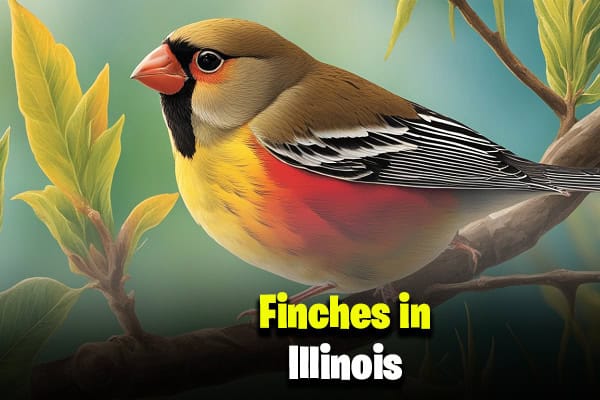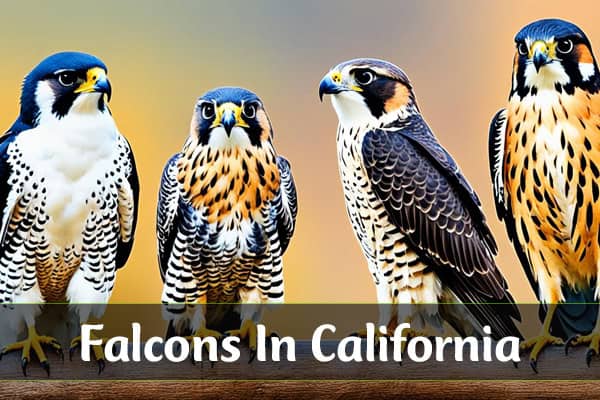7 Top Blue Parrot Species to Keep as Pets
If you’re a pet lover and want to bring a pet home. Then blue parrots are the best option. They will add charm to your house. These bright birds are entertaining to see.
For many years, people have been eager to own blue parrots as pets. Their vibrant colors and friendly personalities enchant many hearts. These birds’ chief characteristics, color, and the joy they bring are among the reasons why they are so popular among bird lovers. However, it is important to note that every blue parrot species has its own characteristics, requirements, and peculiarities.
The Hyacinth Macaw is renowned for its radiant blue quills and sweet nature. It wins the hearts of many U.S. bird fans. According to the American Pet Products Association, blue parrots are currently the most popular pets. However, this post is for you if you want to discover what kinds of blue parrots are available. To assist you in making an informed choice, we will present details on the top 7 varieties of blue parrots in this post.
Popular Blue Parrot Species for Pet Lovers
Many people love blue parrots for their bright colors and fun personalities. Some blue parrots are more popular than others as pets. Here are 7 blue parrot species that are favorites among bird lovers.
- African Grey Parrot
- Caique Parrot
- Blue-and-Gold Macaw
- Budgerigar (Blue Mutation)
- Hyacinth Macaw
- Blue-Headed Pionus
- Blue Indian Ringneck Parakeet
African Grey Parrot
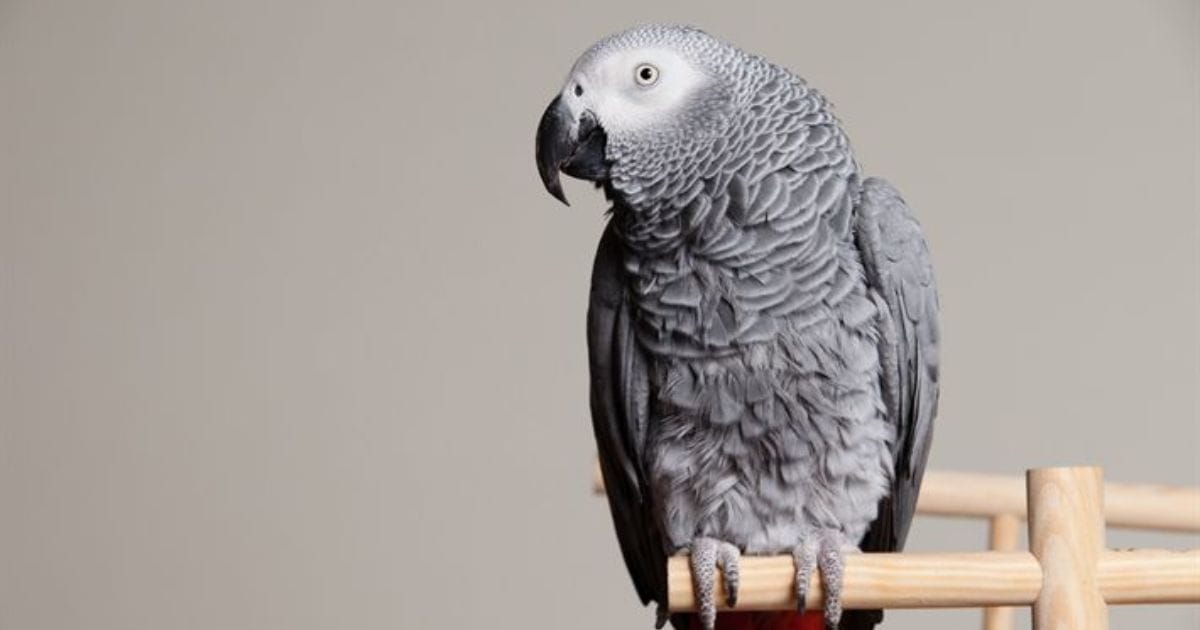
Species Overview
- Length: Medium (10-12 inches)
- Weight: 12-16 ounces
- Life Span: 40-60 years
African grey parrots are beautiful, amazing wild animals. They are one of the most common pet species in Europe, America, and the Middle East. They are Popular for their insight and ability to imitate Their ability to talk and mimic sounds makes them even more charming and beautiful. Their owners often say these grey parrots talk in conversations and strongly connect with their people’s emotions.
African grey parrots are known not only for their great talking ability but also for their intelligence. That is why they are called the Einsteins of the bird world. So, buy an African grey parrot now and welcome a guest into your home who will fill your life with more joy and happiness.
Caique Parrot
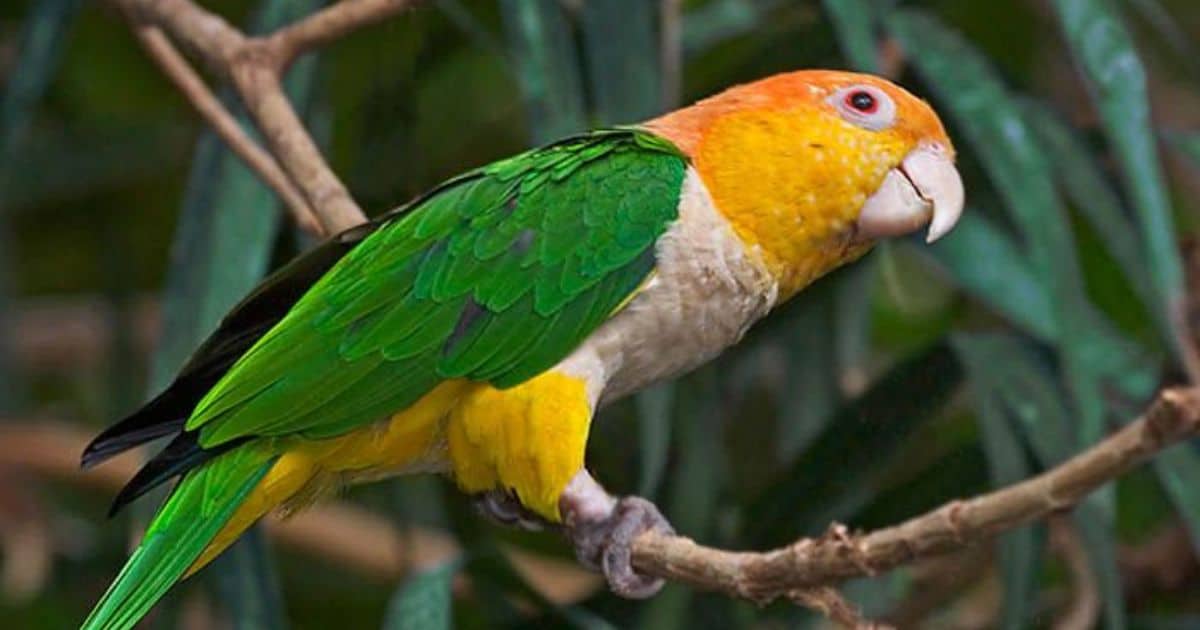
Species Overview
- Length: Small (6-7 inches)
- Weight: 4-6 ounces
- Life Span: 20-30 years
These little, enthusiastic parrots are known for their fiery and underhanded nature. With their energetic blue and yellow crest, Caique Parrots are an emission of assortment that will keep you locked in. These birds are native to South America. They are very popular among people who love birds. So, if you are looking for a bird that is beautiful and playful. Then this pet is the best option for you.
Caique parrots are very gorgeous in appearance. They do not grow very big, and they don’t need much space to be kept. They are often known as the clowns of pet birds. This is because they are energetic and colorful. So, for this reason, they can be great friends for you.
Blue-and-Gold Macaw
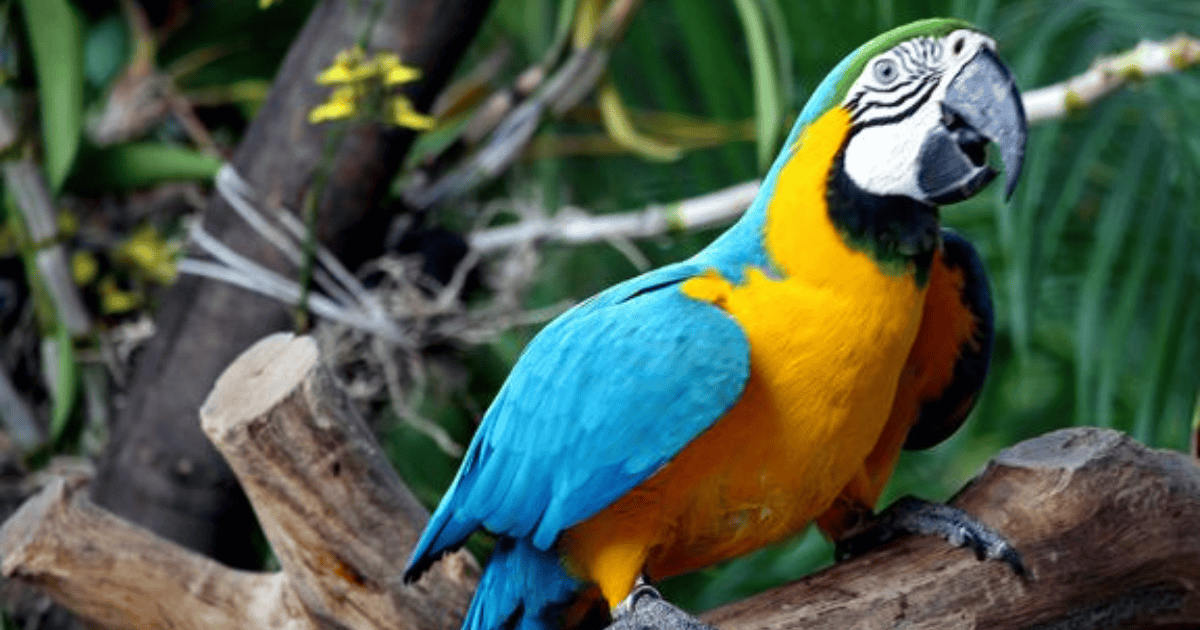
Species Overview
- Length: 30 to 36 inches
- Weight: 28 to 46 ounces
- Life Span: 30 to 60 years
A huge delightful bird with wonderful lively blue and yellow plumes, the Blue-and-Gold Macaw This creature estimates 30-36 inches and weighs 28-46 ounces, so it takes a ton of consideration regarding having this bird in our home. They need a huge nook, and mental excitement through toys and exercises.
Budgerigar (Blue Mutation)
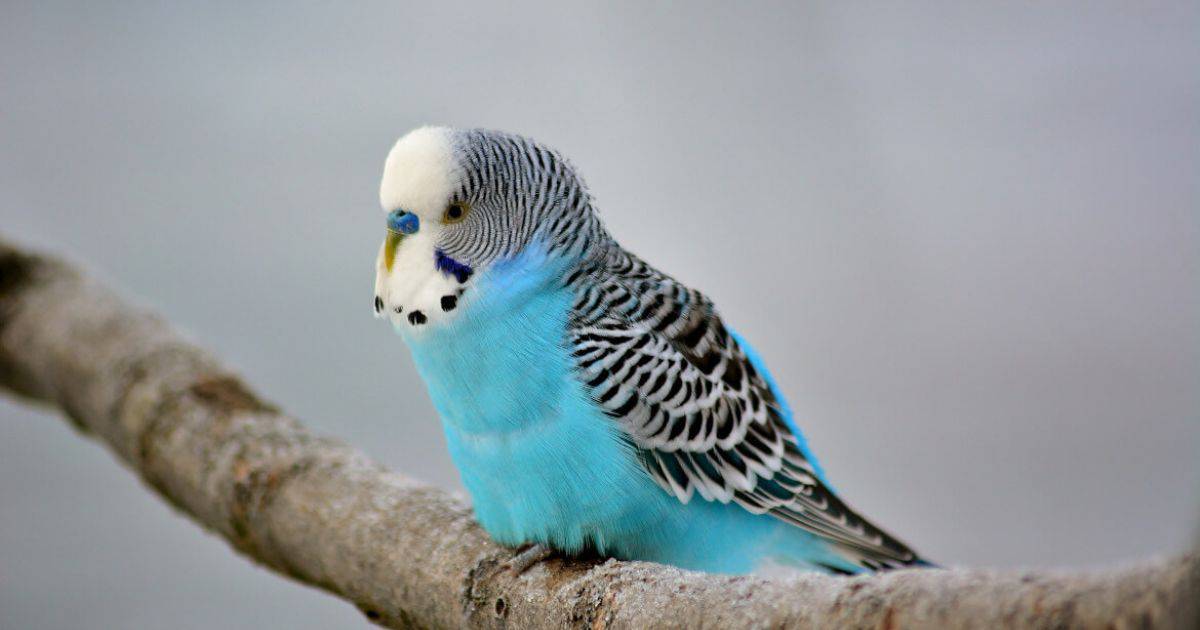
Species Overview
- Length: 6 to 8 inches
- Weight: 1 ounce
- Life Span: 10+ years
The Blue-and-Gold Macaw is another vivid bird coming in dazzling blue and brilliant yellow tone. This bird measures between 30 and 36 inches. It weighs between 28 and 46 ounces. This indicates that it requires careful consideration and care.
Hyacinth Macaw
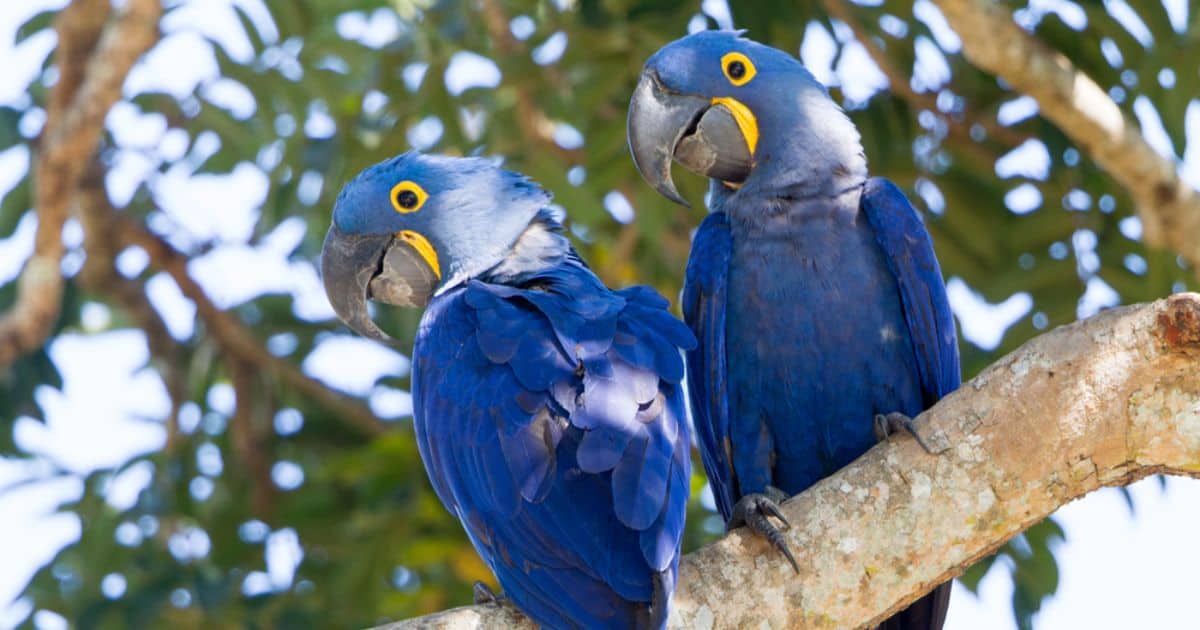
Species Overview
- Length: 100 cm (39 in)
- Weight: 1.2 to 1.7 kg (2.6 to 3.7 lb)
- Life Span: 50 to 60 years in captivity, potentially longer in the wild
The largest blue parrot that can fly is the Hyacinth Macaw. Its long tail and brilliant blue plumage are quite stunning. It has a powerful, curved beak and bright blue feathers. The natural habitat of this bird is South America, particularly Brazil. Hyacinth Macaws are renowned for their wit and good humor. They often eat hard nuts and fruits. Unfortunately, they are endangered due to habitat loss and illegal pet trade.
Blue-Headed Pionus
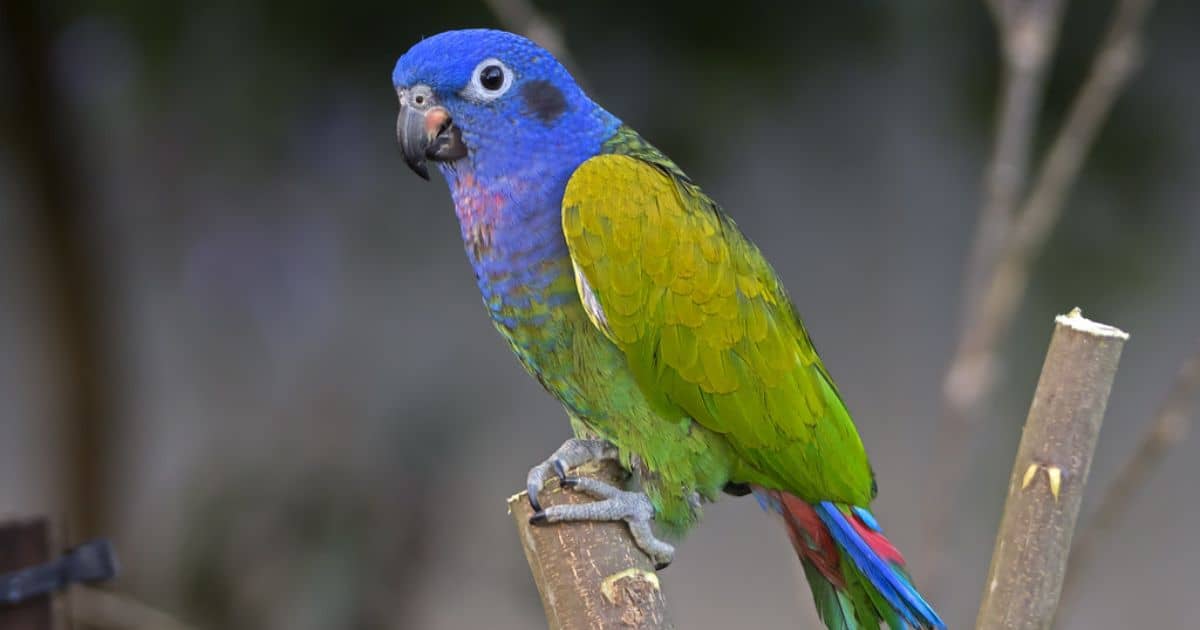
Species Overview
- Length: 11 inches
- Weight: 8 to 9 ounces
- Life Span: 40 years
This kind of parrot is medium in size, reaching a maximum length of 11 inches and weighing between 8 and about 9 ounces. With their kind and kind disposition, Blue-Headed Pionus are excellent housemates and genuine problem-solvers for those who live in cramped apartments. They require careful supervision when playing since they enjoy attention. They love attention, and they need close supervision at playtime.
Blue Indian Ringneck Parakeet
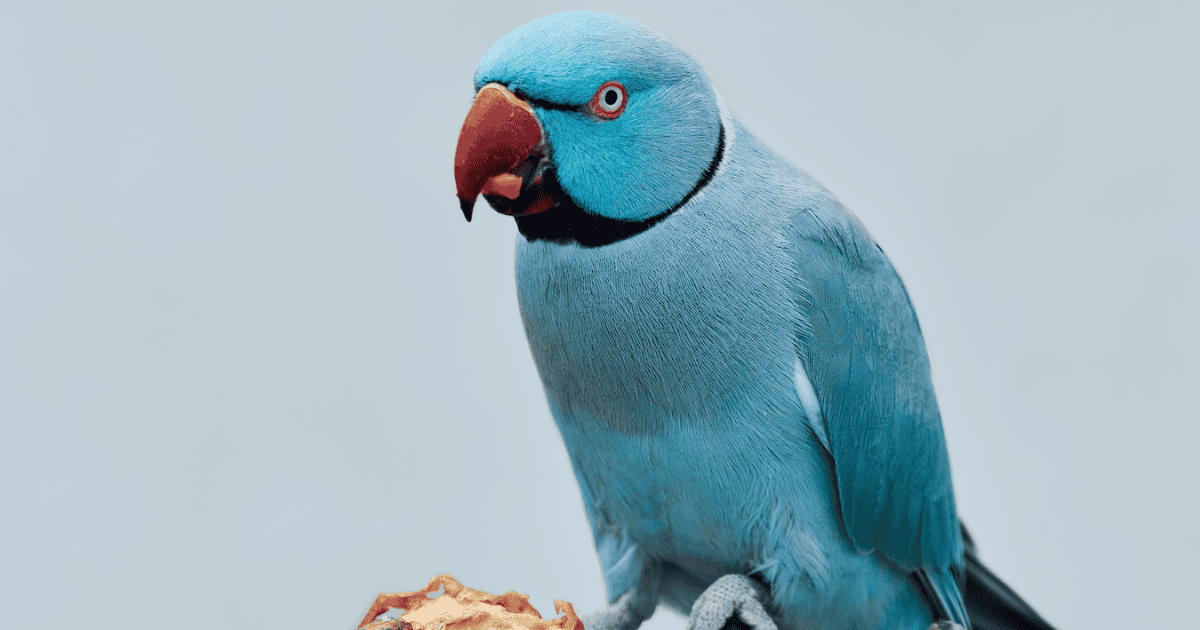
Species Overview
- Length: 14 to 17 inches
- Weight: 4 ounces
- Life Span: 25 to 30 years
A colorful, intelligent bird, the Blue Indian Ringneck Parakeet can reach up to 14-17 inches long and can weigh about 4 ounces. They love socializing and mental stimulation to ensure they live an enjoyable life, also making great pets in terms of entertainment as well as interaction.
Ready to bring joy into your home? Visit Quality Birds Online now to find the ideal bird companion for you and experience the magic of avian friendship!
Care and Maintenance of Blue Parrot Species
Caring for blue parrots means knowing what they need to be happy. Good nutrition — friends to play with and a comfortable home. We will discuss what they do eat, how to make friends and where hamsters should dwell.
Dietary Needs
Blue parrots need a healthy diet to stay well. Their diet should include:
- Premium vitamin and mineral pellets.
- Green vegetables, fruits (which also an excellent source of vitamins and natural sugars)
- Seeds are treats, not main food.
- Calcium, important for strong bones and beaks like cuttlebone.
They are healthy because they watch their diet. It makes sure they get all the nutrients they need.
Socialization Tips
Being social is key to parrots’ happiness. Here’s how to help:
- Play with your parrot every day to bond.
- Give them new toys and puzzles to keep them busy.
- Having more than one bird can be good for them.
- Use positive rewards during training to build trust.
By focusing on socialization, parrots can grow up happy and confident.
Housing Requirements
Blue parrots need a safe and comfortable place to live. Important things include:
- A big cage for flying and climbing, with horizontal bars.
- Cages made from safe, non-toxic materials
- Different perches for their feet.
- Cleaning the cage often keeps it clean.
Good housing makes parrots happy and healthy. It’s like a cozy home for them.
Conclusion
Blue parrots are amazing pets because of their bright colors and fun personalities. They add a special touch to any home. But knowing what they need, like food, friends, and a good place to live is essential.
Having a blue parrot can make you feel happy and not alone. It can become part of your family. Every time you talk to it, it improves your life and theirs.
Pondering getting a blue parrot is a significant choice. However, if you consider it, it will bring magnificence and joy into your life. It shows us how exceptional our association with creatures can be.
Frequently Asked Questions
What Are Some Popular Blue Parrot Species To Own As Pets?
The Hyacinth Macaw, Blue-winged Macaw, and Little Blue Parakeet are popular blue parrot species known for their beauty and fun personalities.
What truth be told, do blue parrots eat?
Blue parrots require a diet of pellets, fresh fruits, and vegetables but should never eat avocado or chocolate.
How can I ensure my blue parrot has adequate socialization?
Spend time with your blue parrot and play with them. Let them meet other pets and family. This helps them feel happy and well-adjusted.
What housing is appropriate for blue parrots?
Blue parrots need a big cage that provides space for flying and moving. The cage should be safe and have toys. They also need a play area outside their cage.
Are blue parrots good pets for families?
Yes, blue parrots are good for families. They are friendly and love people. But always watch them when kids play with them.

